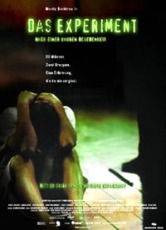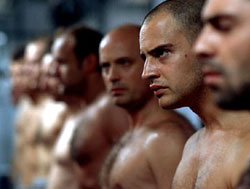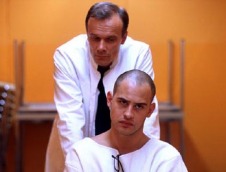|
Das Experiment
|
| |
 |
Germany, 2001. Rated R. 113 minutes.
Cast:
Moritz Bleibtreu, Christian Berkel, Justus Von Dohnànyi, Maren Eggert,
Oliver Stokowski, Wotan Wilke Möring, Edgar Selge, Andrea Sawatzki, Timo
Dierkes, Nicki Von Tempelhoff, Antoine Monot Jr, Jacek Klimontko
Writers: Mario Giordano (also novel Black Box), Don Bohlinger,
Christoph Darnstädt, Oliver Hirschbiegel (uncredited), Friedrich Wildfeuer
(uncredited)
Music: Alexander von Bubenheim
Cinematographer: Rainer Klausmann
Producers: Marc Conrad, Norbert Preuss, Friedrich Wildfeuer
Director: Oliver Hirschbiegel
LINKS
|
Read
the AboutFilm interviews with Moritz Bleibtreu and Oliver Hirschbiegel.
 n
five millennia of recorded history, the human race has come a long way, from
primitive hunter/gatherers to space explorers. But has humanity itself changed?
Empirical research--the kind that periodically appears in newspapers and regularly
on the Discovery Channel--suggests not. It suggests that men are and have always
been more likely than women to join groups, to follow rules and orders unquestioningly,
and, of course, to exhibit aggressive behavior. This is all supposedly encoded
in our DNA as a consequence of our prehistoric male/female, hunter/gatherer
division of labor. Because men are rule abiders, the structure of society effectively
constrains their more destructive impulses. Mother nature's system of checks
and balances works quite tidily.
n
five millennia of recorded history, the human race has come a long way, from
primitive hunter/gatherers to space explorers. But has humanity itself changed?
Empirical research--the kind that periodically appears in newspapers and regularly
on the Discovery Channel--suggests not. It suggests that men are and have always
been more likely than women to join groups, to follow rules and orders unquestioningly,
and, of course, to exhibit aggressive behavior. This is all supposedly encoded
in our DNA as a consequence of our prehistoric male/female, hunter/gatherer
division of labor. Because men are rule abiders, the structure of society effectively
constrains their more destructive impulses. Mother nature's system of checks
and balances works quite tidily.
Or does it? What about situations where the rules permit and even encourage
violence? Maximum security prisons, for example. Most are violent institutions,
where weak prisoners are abused by the strong, and guards victimize both. Of
course, these are places full of hardened criminals and authority-hungry disciplinarians.
Surely they cannot be representative of the basic nature of average guys. Can
they?
That is the fascinating question posed by Dr. Klaus Thon (Edgar Selge) and
Dr. Jutta Grimm (Andrea Sawatzki) in the impressive new German film, Das
Experiment. They have conceived an experiment in which they will recruit
a couple dozen ordinary men and cast them as inmates and guards in a make-believe
prison for two weeks. Ominously, the "inmates" are asked to waive their civil
rights in order to participate in the experiment, but the promise of a few thousand
German marks is too alluring. They are required to follow the rules of the "prison,"
while the task of the "guards" is to enforce the rules--without resorting to
physical violence.
Tarek Fahd (Moritz Bleibtreu of Run Lola Run), a sometime journalist
slumming as a cab driver, becomes convinced that the experiment will make a
riveting story. He sells his editor on the idea, and armed with a video camera
disguised as a pair of eyeglasses, successfully passes the scientists' screening
process. They cast him as a prisoner.
For a time, all the participants view the experiment as a big joke, but Tarek,
in pursuit of his story, provokes the guards to see how far the experiment will
go. As he is warned by his inscrutable cellmate Steinhoff (Christian Berkel),
this is a mistake. The guards, led by airline ground crewman Berus (Justus Von
Dohnànyi), enforce the rules in ways that severely stretch the definition of
non-violent. The wall between play-acting and reality crumbles, and the situation
escalates beyond the control of the scientists. Violence is, of course, inevitable,
as is a little hubris for the reckless experimenters.
Das Experiment posits a thin line between civilization and savagery,
arguing that men have not evolved beyond their aggressive, destructive impulses,
and have an innate need to dominate those around them. Placed in a volatile
situation and with their darker natures freed from societal strictures, the
men in Das Experiment become ferocious, vindictive animals.
Sociopath Tyler Durden, in the similarly male-centered Fight
Club, posits that women are emasculating manipulators, causing men to
submit to artificial regimes that alienate them from their true selves. Das
Experiment addresses women differently, as a positive influence in men's
lives, perhaps even as the missing half of a perfect whole. The character of
Dora (Maren Eggert, in a flat performance), who initiates a romantic liaison
with Tarek just before he enters the experiment, is not a person; she is an
idea. The film divulges little about her, only that she has recently lost her
father and is still in shock (a hint, perhaps, that women need men as much as
men need women). The memory of his evening with Dora is Tarek's only solace,
a haven for his psyche when the outside situation becomes unbearable.
Das Experiment being a German film, most foreign audiences will inevitably
read a fascist subtext into the movie. Indeed, one of the prisoners finally
accuses of Berus of being a Nazi (a common epithet in Germany, admittedly).
 Berus
has by that time become the Nazi caricature that one often sees in American
films, the well-groomed, sadistic stickler for the rules. Fortunately, the movie
brings Berus to that point incrementally, never ignoring his basic humanity,
and newcomer Von Dohnànyi refuses to resort to broad characterizations. Watching
the terrifying transformation of Berus and the other guards, you can almost
understand how the horror of Nazism could happen, not just in Germany, but anywhere.
Berus
has by that time become the Nazi caricature that one often sees in American
films, the well-groomed, sadistic stickler for the rules. Fortunately, the movie
brings Berus to that point incrementally, never ignoring his basic humanity,
and newcomer Von Dohnànyi refuses to resort to broad characterizations. Watching
the terrifying transformation of Berus and the other guards, you can almost
understand how the horror of Nazism could happen, not just in Germany, but anywhere.
Focusing overly on a Nazi subtext, however, unfairly confines the scope of
what Das Experiment has to say. Inspired by the real life Stanford
Prison Experiments of the 1970s and based on the novel Black Box
by Mario Giordano, Das Experiment is uncommonly thrilling and thought-provoking.
Though the situation is obviously contrived, the emotional journey of the characters
is truthful. A weakness of the film might be that it imparts only the most rudimentary
exposition, and fails to shape Dora into a complete individual. The decision
to excise most background material, however, pulls the story's universal dimensions
into relief. Its comments on the brutal nature of men are supported by evidence:
though the Stanford Prison Experiments did not escalate to same point, many
events depicted in the film closely parallel what happened at Stanford. The
most legitimate complaint about Das Experiment is the improbably fortuitous
appearance of a screwdriver.
Fight Club is another obvious inspiration for Das Experiment,
one that director Oliver Hirschbiegel readily acknowledges, praising David Fincher's
movie "because it takes men seriously as men and never ridicules them for their
sheer ridiculousness." Though the stories differ, similarities in themes, stark
visual styles, and even soundtrack selections are unmistakable. Does Hirschbiegel
fear that Das Experiment will be similarly misunderstood, too? "I must
say, I feared that when we had the first screenings in the States, but to my
amazement it didn't happen. The people responded to this film the same way they
responded in Germany. And Fight Club did very well in Germany, you know,"
comments Hirschbiegel. Indeed, Das Experiment won the best director prize
at the 2001 Bavarian Film Awards and a number of Golden Lolas at German Film
Awards (for Bleibtreu as Best Actor, von Dohnànyi as Best Supporting Actor,
and Best Art Direction), and later became Germany's official foreign-language
Oscar™ entry.
It should be made clear, however, that Das Experiment never sermonizes
about good and evil. The film is fully focused on characters and narrative,
allowing you to extrapolate the implications of what you see for yourself. The
result? Das Experiment is a psychic explosion of a movie--a film as difficult
to watch as it is to stop watching, pulling you to the edge of your seat in
order to insinuate itself into your brain. There are those who refuse to believe
that the potential for what they see on the screen lurks inside us all. Yet
in an extreme situation, those who lack the self-knowledge to recognize and
comprehend their darker impulses are the ones about whom we should worry the
most.
Read
the AboutFilm interviews with Moritz Bleibtreu and Oliver Hirschbiegel.
Review
© September 2002 by AboutFilm.Com and the author.
Images © 2002 Samuel Goldwyn Films. All Rights Reserved.


 Berus
has by that time become the Nazi caricature that one often sees in American
films, the well-groomed, sadistic stickler for the rules. Fortunately, the movie
brings Berus to that point incrementally, never ignoring his basic humanity,
and newcomer Von Dohnànyi refuses to resort to broad characterizations. Watching
the terrifying transformation of Berus and the other guards, you can almost
understand how the horror of Nazism could happen, not just in Germany, but anywhere.
Berus
has by that time become the Nazi caricature that one often sees in American
films, the well-groomed, sadistic stickler for the rules. Fortunately, the movie
brings Berus to that point incrementally, never ignoring his basic humanity,
and newcomer Von Dohnànyi refuses to resort to broad characterizations. Watching
the terrifying transformation of Berus and the other guards, you can almost
understand how the horror of Nazism could happen, not just in Germany, but anywhere.
